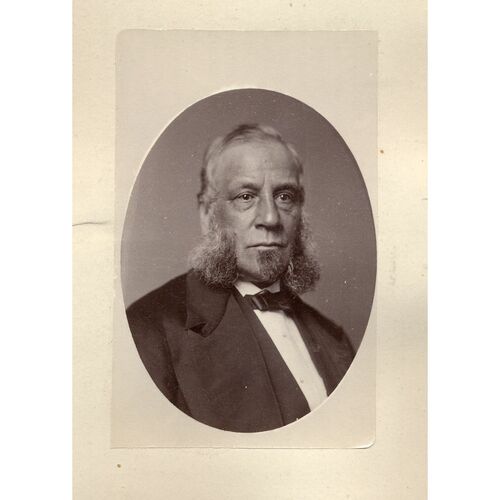LEPROHON, JEAN-LUKIN (baptized Jean-Baptiste-Lucain), physician, editor, professor, politician, and office holder; b. 7 April 1822 in Chambly, Lower Canada, son of Édouard-Martial Leprohon, a potash inspector, and Marie-Louise Lukin; d. 23 May 1900 in Montreal and was buried in the Côte-des-Neiges Cemetery.
After finishing his classical education at the Séminaire de Nicolet, of which his uncle, Abbé Joseph-Onésime Leprohon* was the director, Jean-Lukin Leprohon enrolled in the faculty of medicine at McGill College in Montreal. He completed his medical studies in May 1843 and went to live in Paris until 1845. Returning to Canada, he obtained his licence as a physician on 15 November and settled in Saint-Charles-sur-Richelieu, where he went into practice. On 17 June 1851, in the parish of Notre-Dame in Montreal, he married writer Rosanna Eleanora Mullins*. They were to have 13 children, 8 of whom outlived him.
Leprohon was an active man, deeply humane and endowed with a superior intellect. He founded the first medical journal in Canada published entirely in French, La Lancette canadienne (Montreal), which made its appearance in January 1847. He hoped it would serve to break down the isolation of French-speaking doctors scattered across Lower Canada, and he invited his colleagues to form an association in order to strengthen the ties “between men sharing the same mission to humanity.” He made his readers aware of public health concerns and stressed how necessary it was for doctors to have a good moral and scientific education. Although the journal was well received by the press, it ceased publication six months later for lack of contributors and financial support.
From 1855 Leprohon pursued his medical career in Montreal, at first as a military doctor. In 1870, with two other physicians, William Hales Hingston* and John Summerfield Chapman, he founded the Women’s Hospital of Montreal. When a medical faculty was established at Bishop’s College in Lennoxville the following year, he accepted the position of professor of hygiene. During this period he was also consulting physician to the Montreal Dispensary.
Along with his professional activities, Leprohon, as alderman for Saint-Antoine Ward from 1858 to 1861, took a particular interest in the state of the city’s sanitation. In 1872 he was named vice-consul of Spain in Montreal, a position that, although more honorary than lucrative, bore witness to the esteem in which he was held. In 1881 the Spanish government awarded him the Order of Charles III in recognition of his services.
Leprohon was a member of numerous medical and civic associations. The Pathological Society and the Montreal Medico-Chirurgical Society were among the organizations to which he devoted time and energy. He was vice-president of the College of Physicians and Surgeons of the Province of Quebec. In 1866 he served on a committee to investigate sanitary conditions in Montreal and to make recommendations for improving hygiene in the city. In 1874 Leprohon also signed a report on smallpox in Canada. In 1890 he was appointed to the Catholic committee of the Council of Public Instruction, of which he remained a member until his death. He also was honorary vice-president of the Canadian National League, which was founded in 1892.
In the exercise of his many functions, Jean-Lukin Leprohon earned the respect and admiration of his fellow citizens, both French-and English-speaking. A “cultured and energetic man,” conscious of his humanitarian and social responsibilities and especially concerned with matters of public health, he proved to be one of the pioneers of social and preventive medicine in French Canada. The accolade “an upright man,” which he put forward as an ideal for his readers, can fittingly be applied to him.
AC, Montréal, État civil, Catholiques, Notre-Dame de Montréal, 26 mai 1900. ANQ-M, CE1-39, 12 avril 1822; CE1-51, 17 juin 1851. ANQ-Q, E13/74–76; E18/52. Arch. de la ville de Montréal, Dossier 016.510. NA, RG 68, General index, 1841–67. Lettres à Pierre Margry de 1844 à 1886 (Papineau, Lafontaine, Faillon, Leprohon et autres), L.-P. Cormier, édit. (Québec, 1968). Que., Statutes, 1870, c.57. Montreal Daily Star, 25 May 1900. La Presse, 25 mai 1900. Borthwick, Hist. and biog. gazetteer, 206. Canadian men and women of the time (Morgan; 1898), 577–78. Abbott, Hist. of medicine, 65–70. Henri Deneau, named Brother Adrian, “Life and works of Mrs. Leprohon, née R. E. Mullins” (ma thesis, Univ. de Montréal, 1948). Édouard Desjardins, “Biographies de médecins du Québec,” L’Union médicale du Canada (Montréal), 107 (1978): 612; “L’origine de la profession médicale au Québec, III,” 103 (1974): 1114–15; “La petite histoire du journalisme médical au Canada,” 101 (1972): 122. “La famille Leprohon,” BRH, 39 (1933): 513–14. “Jean Lukin Leprohon, M.D.,” Canada Medical Record (Montreal), 28 (1900): 278.
Cite This Article
Monique Leclerc-Larochelle, “LEPROHON, JEAN-LUKIN (baptized Jean-Baptiste-Lucain),” in Dictionary of Canadian Biography, vol. 12, University of Toronto/Université Laval, 2003–, accessed January 20, 2025, https://www.biographi.ca/en/bio/leprohon_jean_lukin_12E.html.
The citation above shows the format for footnotes and endnotes according to the Chicago manual of style (16th edition). Information to be used in other citation formats:
| Permalink: | https://www.biographi.ca/en/bio/leprohon_jean_lukin_12E.html |
| Author of Article: | Monique Leclerc-Larochelle |
| Title of Article: | LEPROHON, JEAN-LUKIN (baptized Jean-Baptiste-Lucain) |
| Publication Name: | Dictionary of Canadian Biography, vol. 12 |
| Publisher: | University of Toronto/Université Laval |
| Year of revision: | 1990 |
| Access Date: | January 20, 2025 |


![[Jean Lukin Leprohon, M.A., M.D., C.M.] [image fixe] / Studio of Inglis Original title: [Jean Lukin Leprohon, M.A., M.D., C.M.] [image fixe] / Studio of Inglis](/bioimages/w600.5470.jpg)

